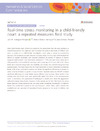Please use this identifier to cite or link to this item:
https://accedacris.ulpgc.es/jspui/handle/10553/132149
| Title: | Real-time stress monitoring in a child-friendly court: a repeated measures field study | Authors: | Rodríguez Pellejero, José Manuel Mulero Henríquez, Itahisa Santana Amador, Zaira del Carmen |
UNESCO Clasification: | 6102 Psicología del niño y del adolescente 6105 Evaluación y diagnóstico en psicología |
Keywords: | Heart-Rate-Variability Criminal Court Biofeedback Testimony Anxiety, et al |
Issue Date: | 2024 | Project: | Psicología Forense | Journal: | Humanities & Social Sciences Communications | Abstract: | Most child-friendly court reforms are based on the assumption that the court setting is a stressful experience. Our objective was to analyze the acute stress levels of children who come to testify in a child-friendly investigative court using a person-by-environment approach. We employed a simple repeated measures design for this study, which included 42 minors of Spanish nationality who provided testimony as victims of violence in Spain’s inaugural Child-Friendly Court. Among the participants, 73.8% were girls with a mean age of 12.5 years (SD = 3.4), and 26.2% were boys with a mean age of 11.4 years (SD = 3.1). Stress levels were measured using heart rate variability, and anxiety was assessed using state-trait questionnaires. The study found that the mean percentile of anxiety remained at moderate levels, while stress remained at medium-low levels. No significant differences in anxiety or stress were found based on gender or type of crime. Repeated measures ANOVA revealed significant differences in stress levels among different court settings. Stress levels in the waiting room and Gesell room were significantly higher than those in the decompression room. In conclusion, the experience of testifying in a Gesell room about the aggressions suffered increases stress levels. However, in this sample and for this Pilot Court, the stress levels observed during testimony did not reach levels considered detrimental to children’s health. Our results lend support to the new European Judicial Policy, which includes the establishment and operation of Specialized Courts adapted to the needs of children and adolescents. | URI: | https://accedacris.ulpgc.es/handle/10553/132149 | ISSN: | 2662-9992 | DOI: | 10.1057/s41599-024-03410-w | Source: | Humanities and Social Sciences Communications[EISSN 2662-9992],v. 11 (1), (Diciembre 2024) |
| Appears in Collections: | Artículos |
Page view(s)
9
checked on Jan 11, 2026
Download(s)
4
checked on Jan 11, 2026
Google ScholarTM
Check
Altmetric
Share
Export metadata
Items in accedaCRIS are protected by copyright, with all rights reserved, unless otherwise indicated.
